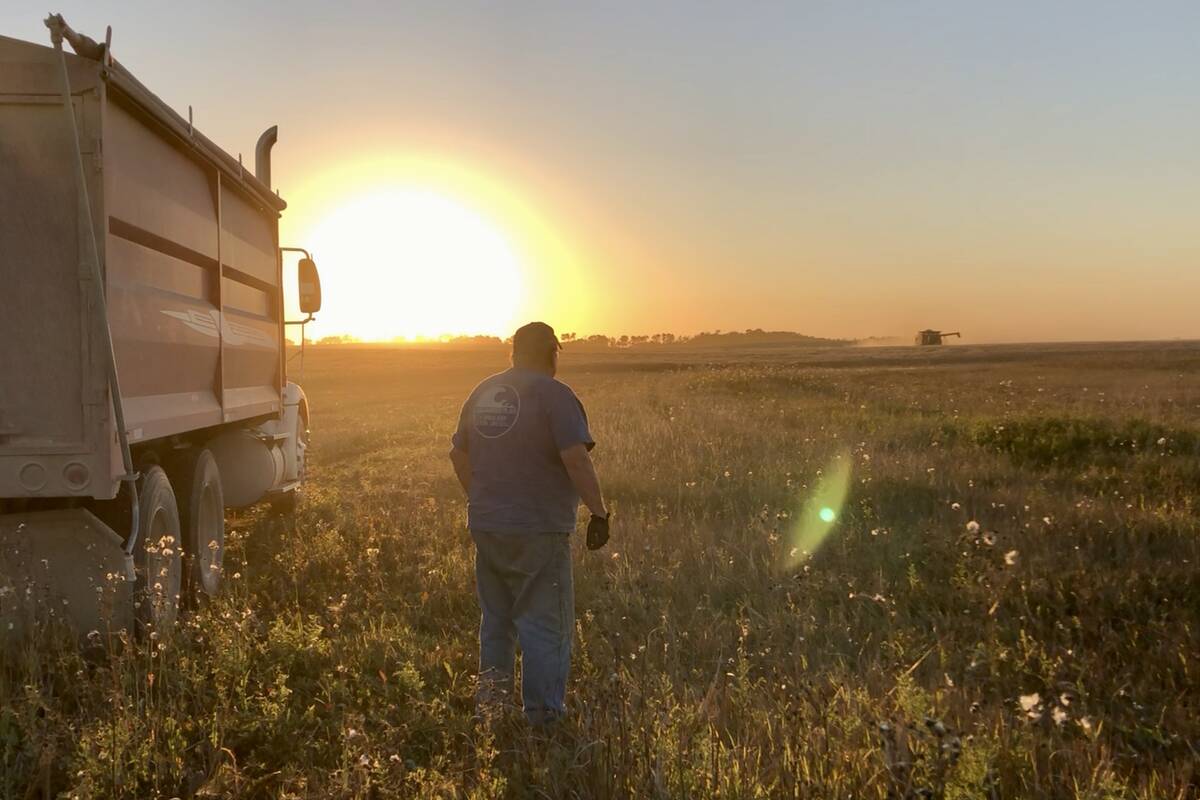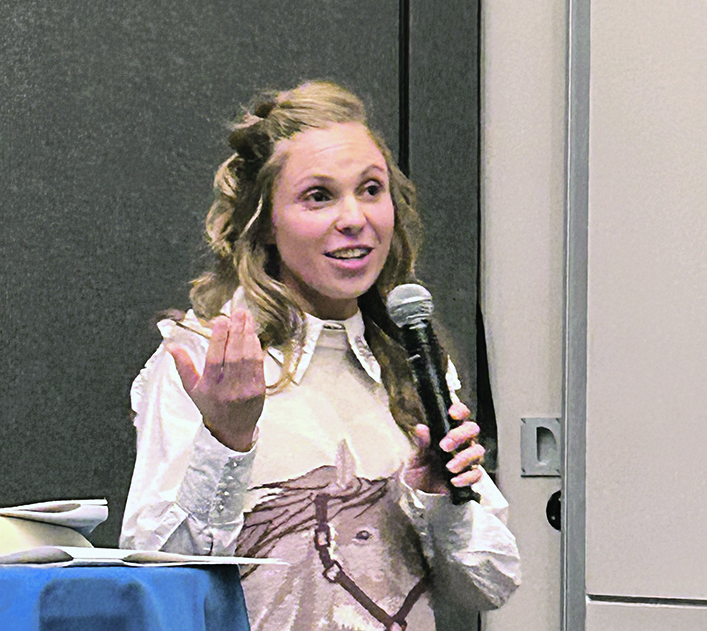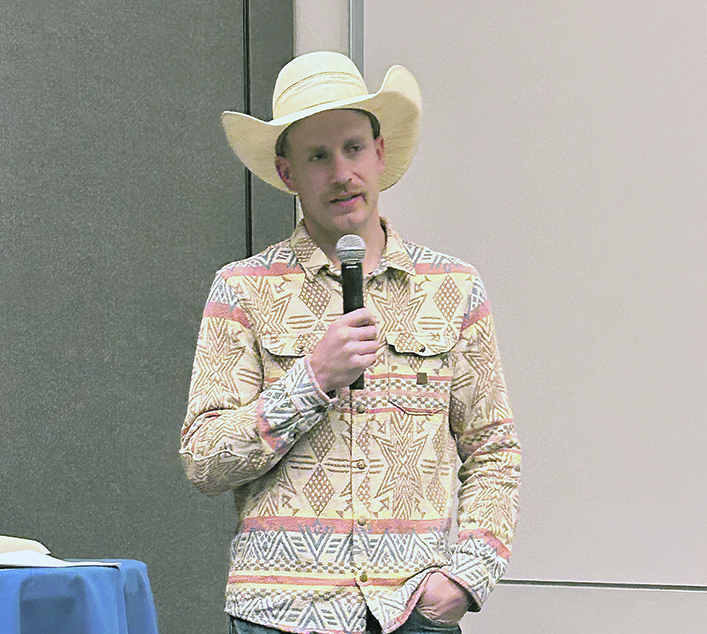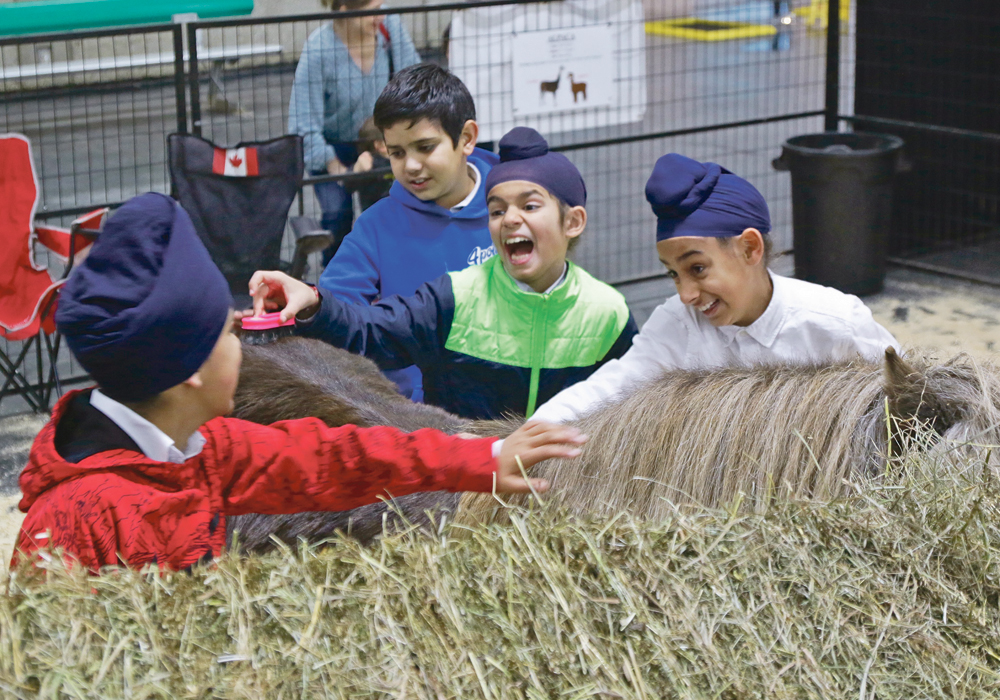Glacier FarmMedia – Farmers have been told they can turn social media to their advantage for almost as long as the concept has been around.
But it’s one thing to hear that and quite another to find time and do it properly.
Trent and Dena Lewis own One Mile Ranch, a beef and pork direct-to-customer operation in Pincher Creek, Alta. They have established their place on social media through an “educate, entertain and inspire” approach to content.
Read Also

VIDEO: Bittersweet harvest for this family farmhand
Bruce Burnett helps his brother harvest wheat and canola for the last time on the family farm in Manitoba where they both grew up.
The strategy has paid off, they told attendees of the Farm Forward event in Edmonton Nov. 9. One slice-of-farm-life video starring one of their daughters garnered 5.8 million views.
“People want to feel something. They don’t want to be sold a product,” Dena Lewis said. “It doesn’t seem to work that way anymore.”
Instead, she said, emotional connection helps foster trust, which is key in turning members of the general public.
Farm Forward was linked to Farmfair International Nov. 7-9 in Edmonton. The presentation, featuring Trent and Dena Lewis, focused on tips for young and aspiring producers.
The Alberta family has built a significant social media presence, leading to corporate sponsorship and advertising pitches that would be the envy of other influencers. As of print time, their base on Instagram had grown to 61,700 followers.
The couple offered 10 tips to help producers upgrade their social media game.
1. Educate, entertain and inspire
This approach makes it less overwhelming to film videos for social media, Dena Lewis said. It’s easy to touch on at least one of those themes in a given video, but first determine the target audience.
Other farmers may be the hardest to attract, said Trent Lewis. Educational content geared for the general public may be old news for fellow producers.
For a non-rural audience, it is necessary to simplify various aspects of farming. The audience probably didn’t click the link to hear an in-depth agronomy lecture. They’ll engage more with something light and easily digestible.
“Everything you do is probably very crazy to them,” said Trent Lewis.
2. Feel no shame
The family social media channel draws a lot of clicks from sheer silliness. One video features Dena Lewis in the kitchen, ready to bake some pumpkin spice cookies, but instead she breaks into a dance. Others show the family riding horses, playing and generally living life on the farm.
The family’s online success eventually attracted Toyota. The automobile maker offered a deal to promote its Tundra truck, a milestone Dena Lewis doubts they would have drawn had they worried about what their family, friends or fellow farmers thought about their posts.

“You had to get over that one pretty quick. It is cool when you start posting and you start not caring and you just do it for fun.”
3. Being authentic is uncomfortable, but necessary
A big key to gaining an online audience is authenticity, Trent Lewis said, but that’s not always easy.
“You feel like you need to fit the mould, but not fitting the mould is probably the best thing you can do. Each of us is unique in our own way. We have something that’s maybe a bit weird or whatever, but those are the things that kind of make you who you are and it’s really what people connect with.”
4. You can’t be scared to fail
The biggest fail is not trying at all, said Dena Lewis.
“You’d be amazed how many videos we put up (that) I only put up because I think they’re funny and I really don’t think they’re going to do good. And those ones often do the best.”
Added Trent, “You miss every shot you don’t take.”
5. Consistency is key
Whether you decide to post once a week or several times per week, it’s important to be consistent for your audience, said Trent Lewis.
“We all start out being ambitious and (having) big hope and when things maybe don’t do what you hope, it’s hard to keep going. But that’s kind of the name of the game. It’s a long-term investment that pays you down the road in ways you don’t really even know.”

6. A hundred people in a room versus 100 views
It’s easy to get discouraged if you only see single-, double- or even triple-digit hits. Farm influencer hopefuls should avoid falling into that trap, attendees heard.
There were only about 100 people in the room of the Edmonton Expo Centre that hosted their presentation. In clicks, that number might have looked paltry. Visualized as people, that impact looks much more significant.
“Even one person caring about what you’re saying, when you think about it as a person, that’s cool,” Dena Lewis said. “That’s a conversation.”
7. Respond to your audience
If the audience has questions, answer them, she said.
“You can learn so much. I always find questions are valuable conversation. It becomes more personable. It’s not just an online thing anymore. It feels like you really know people and you learn what people are interested in quite fast.”
It also presents a chance for feedback and ideas for further content, she noted.
8. Build a community of trust
When you build trust with your audience, they’re more likely to listen to you, she added. That can open opportunities to brand deals like the one the couple made with Toyota.
“And, in Canada, the market is not saturated at all. It doesn’t take very many people to build a community. And when you do that, there’s so much that can come from it.”
9. Create your own market
It’s a “pain point” for many farmers that no matter what you do — whether that’s new farm practices to improve the health and welfare of animals or just producing a better product — the farmer is always a price-taker rather than a price-maker, said Trent Lewis.
Creating your own market dodges that pitfall. You foster customers who decide to buy from you because they can see what you’re doing.
10. Society is disconnected from the food system: show them
The idea that most Canadians do not know where their food comes from can either be a recipe for discouragement or opportunity, the couple said.
Most Canadians don’t know a farmer, Trent Lewis noted.
“They don’t have a connection to who’s producing their food. And I guess it’s kind of a crazy thing and I know, in our little world, that seems far-fetched, but it is the truth. So, it’s great to be able to put that in perspective.”


















